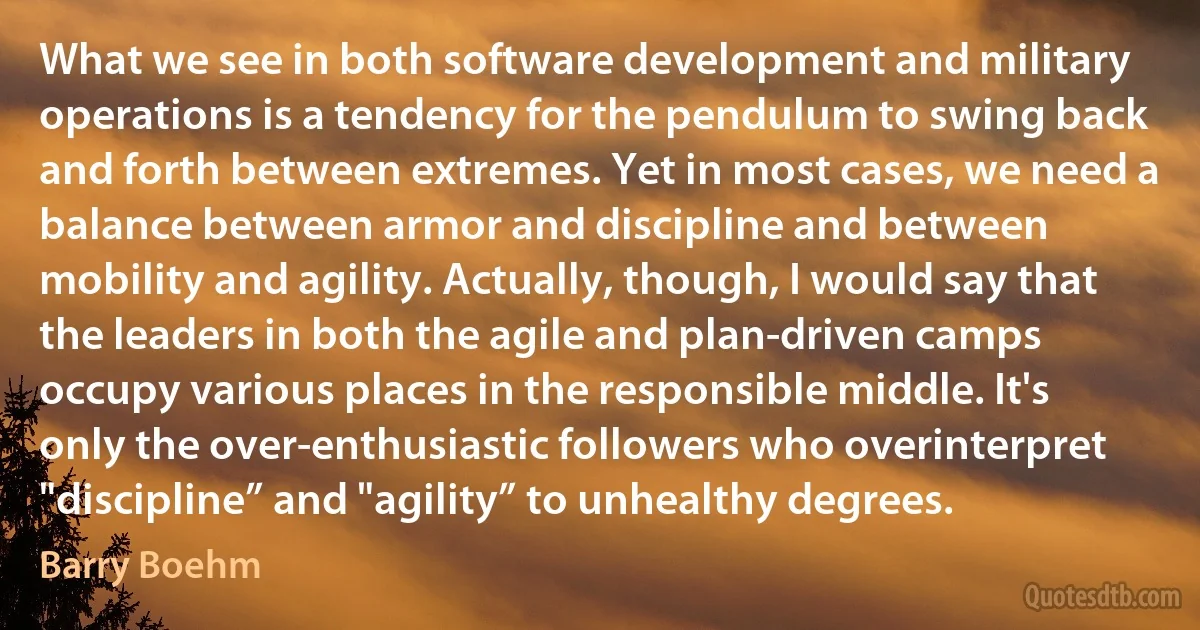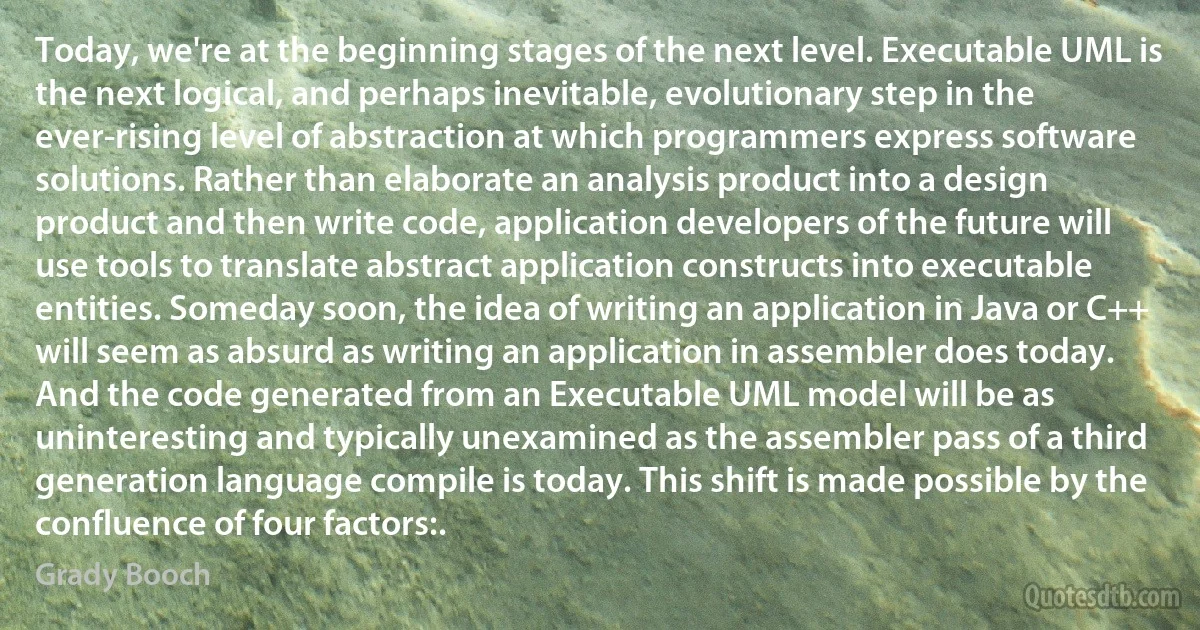Software Quotes - page 20
I often see people saying 'Nobody has produced an invulnerable software system; therefore, nobody will ever produce an invulnerable software system.'"By the same bogus reasoning, nobody will ever reach Mars; nobody will ever find MD5 collisions; nobody will ever cure cancer; nobody will ever prove the Poincare conjecture; nobody will ever clone a human; nobody will ever build a 1GHz CPU; nobody will ever find SHA-1 collisions; nobody will ever break the sound barrier; etc.

Daniel J. Bernstein
Then there are the phones designed for East Asian sensibilities. The same region that brought us the selfie stick also brought us Oppo, a company whose phone's principal selling points include a high-quality camera and custom software that automatically airbrushes photos with faces in them. The ad campaigns emphasize a particularly performative form of femininity, since, in a nice touch, the software makes a guess about the gender of the subject-everyone gets smoother skin, but only the ladies get their lips reddened. Despite successful rollouts in Thailand and Korea, Oppo has not made much of a dent in markets outside East Asia. Their U.S. launch was a bust.

Clay Shirky
At every turn, skeptical observers have attacked the idea that pooling our cognitive surplus could work to create anything worthwhile, or suggested that if it does work, it is a kind of cheating, because sharing at a scale that competes with older institutions is somehow wrong. Steve Ballmer of Microsoft denounced the shared production of software as communism. Robert McHenry, a former editor in chief of Encyclopedia Britannica, likened Wikipedia to a public rest room. Andrew Keen, author of The Cult of the Amateur, compared bloggers to monkeys. These complaints, self-interested though they were, echoed more broadly held beliefs. Shared, unmanaged effort might be fine for picnics and bowling leagues, but serious work is done for money, by people who work in proper organizations, with managers directing their work.

Clay Shirky
Actually, when you have been in the country for a long time... whether it's an Indian kid going to live in California working in a software company or whether its me coming to live here as historian and writer; to a certain extent you become a part of the country, and to a certain extent you remain always the person you were with the set of circumstances, history or personal history. So, I don't think I can ever totally become Indian, but after twenty years I have certainly taken many of the Indian elements. In fact I am sitting talking to you right now in my cotton pajamas and at lunch time I will probably have dal and rice. In various ways I have taken on the life of Delhi; I think I am in the lucky position, in that I can talk to both worlds.

William Dalrymple (historian)
Our problem is that lawyers have taught us that there is only one kind of economic market for innovation out there and it is this kind of isolated inventor who comes up with an idea and then needs to be protected. That is a good picture of maybe what pharmaceutical industry does. It's a bad picture of what goes on, for example, in the context of software development, in particular. In the context of software development, where you have sequential and complementary developments, patents create an extraordinarily damaging influence on innovation and on the process of developing and bringing new ideas to market. So the particular mistake that lawyers have compounded is the unwillingness to discriminate among different kinds of innovation.
We really need to think quite pragmatically about whether intellectual property is helping or hurting, and if you can't show it's going to help, then there is no reason to issue this government-backed monopoly.

Lawrence Lessig
A free culture has been our past, but it will only be our future if we change the path we are on right now. Like Stallman's arguments for free software, an argument for free culture stumbles on a confusion that is hard to avoid, and even harder to understand. A free culture is not a culture without property; it is not a culture in which artists don't get paid. A culture without property, or in which creators can't get paid, is anarchy, not freedom. Anarchy is not what I advance here. Instead, the free culture that I defend in this book is a balance between anarchy and control. A free culture, like a free market, is filled with property. It is filled with rules of property and contract that get enforced by the state. But just as a free market is perverted if its property becomes feudal, so too can a free culture be queered by extremism in the property rights that define it. That is what I fear about our culture today. It is against that extremism that this book is written.

Lawrence Lessig
I'm a teenage kid who's interested in improving the world (mostly through law, politics, and technology).
This year, I'm going to try to update my weblog daily with interesting thoughts, program some interesting new website software, and work on some website projects that help people better understand what's going on in American politics.

Aaron Swartz
The GNU GPL is not Mr. Nice Guy. It says "no" to some of the things that people sometimes want to do. There are users who say that this is a bad thing - that the GPL "excludes" some proprietary software developers who "need to be brought into the free software community."
But we are not excluding them from our community; they are choosing not to enter. Their decision to make software proprietary is a decision to stay out of our community. Being in our community means joining in cooperation with us; we cannot "bring them into our community" if they don't want to join.
What we can do is offer them an inducement to join. The GNU GPL is designed to make an inducement from our existing software: "If you will make your software free, you can use this code." Of course, it won't win 'em all, but it wins some of the time.

Richard Stallman
Free software permits students to learn how software works. Some students, on reaching their teens, want to learn everything there is to know about their computer and its software. They are intensely curious to read the source code of the programs that they use every day. To learn to write good code, students need to read lots of code and write lots of code. They need to read and understand real programs that people really use. Only free software permits this.
Proprietary software rejects their thirst for knowledge: it says, "The knowledge you want is a secret - learning is forbidden!” Free software encourages everyone to learn. The free software community rejects the "priesthood of technology”, which keeps the general public in ignorance of how technology works; we encourage students of any age and situation to read the source code and learn as much as they want to know. Schools that use free software will enable gifted programming students to advance.

Richard Stallman
Often as you move comments around and have similar comments adjacent to each other, you find that half of the words can be cut out. Because a sentence says it all if the sentence is in just the right place. On Ward's wiki, the process has been called "refactoring," which is what we call the process in software. Ward's wiki is about software and it has software people on it, so they call it refactoring. Anyplace else it would probably be called editing. So on Ward's wiki, refactoring is an ongoing process. The assumption is that when something turns out to not be ideal, it will be refactored again. Everything is subject to refactoring.

Ward Cunningham
There are two ways of constructing a software design: One way is to make it so simple that there are obviously no deficiencies, and the other way is to make it so complicated that there are no obvious deficiencies. The first method is far more difficult. It demands the same skill, devotion, insight, and even inspiration as the discovery of the simple physical laws which underlie the complex phenomena of nature.

C. A. R. Hoare



